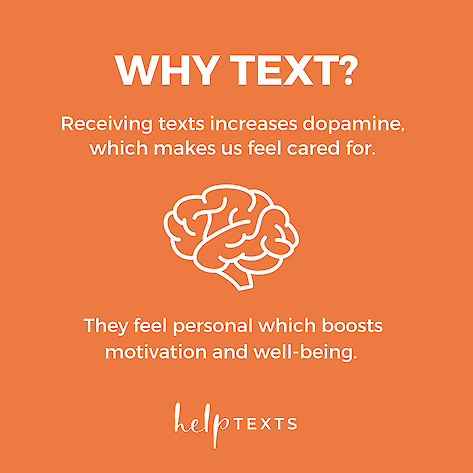Why Choosing Text Was The Best Decision I Could Have Made For Grievers
When I first chose text messaging as the vehicle I'd use to build a global grief support platform, I thought it would be my MVP - something I could fund off the side of my desk while keeping my tech job. Text, I thought, was affordable, scalable, and nearly ubiquitous.
I also remembered that, when my husband died, I couldn't read. Anything more than a few sentences and I would lose my train of thought. So text messaging seemed perfect.
For the first few years after launching Help Texts (we were called Grief Coach back then), people either a) assumed we were an app or b) asked why we weren't an app. I'd built apps before, so at first I responded simply that text seemed like a low threshold, "we come to you" option for people deep in grief. Plus we wanted to send tips and support to friends and family who wanted to help their grieving loved ones, so text was the easiest way to remind them of special dates and send along quick suggestions.
Flash forward 10 years and I believe my decision to build a text messaging platform was the best decision I could possibly have made. I've learned a lot about the technology, psychology, neuroscience, and impact of text as a mental health intervention. Other technologies come and go, but everyone still loves text messages.
Here's what I've learned:
-
 Texts have high engagement and retention: 90% of people open a text within 3 minutes. 86% of Help Texts subscribers continue receiving texts for a full year.
Texts have high engagement and retention: 90% of people open a text within 3 minutes. 86% of Help Texts subscribers continue receiving texts for a full year. -
Texts break through barriers. They're low cost, and you don't need a smartphone or even the internet to access them. Our texts are written for a 7th grade reading level, which helps with accessibility and makes them translate well into other languages too.
-
There's no stigma when receiving texts. They're a discreet, easy way to receive support, even for people who "don't want to talk about it." I think this is part of the reason that men love Help Texts as much as they do.
-
I've now learned that text messages boost motivation. Unlike when we see app alerts or email pouring into our inboxes, receiving a text message feels good. It increases dopamine, which makes us feel cared for, which in turn boosts motivation and well-being.
-
Texts are easy for friends and family to receive. Supporters appreciate that we send pragmatic, thoughtful tips and date reminders straight to their phones, where they'll always see them.
-
Text makes it possible to tailor our grief support based on age, relationship, cause of death, time since death, and so much more.
-
Our carefully curated text messages are safe, created by world-leading bereavement experts, and reviewed by thanatologists. Organizations can feel confident that the grief support they're delivering is safe, with clear guardrails and 24/7 crisis support available for all subscribers.
-
Text messages work. Pure and simple. They're incredibly effective. Our published research shows a 95% satisfaction rate (even higher with men).
Here at Help Texts, our data speaks for itself. Nobody is asking me when we're launching an app anymore. Text messaging is so simple that it gets overlooked, but it's the simplicity that makes it powerful. Text does the work for you.
When life is hard, texts are easy. 💙
---
About Help Texts
Help Texts is the world's leading clinically sound, scalable, bereavement intervention. We deliver affordable, multilingual support globally via text message for all of life's toughest moments. With extraordinary acceptability (95%) and 6-month retention (90%) rates, Help Texts' light-weight solution makes it easy for employers, providers, payers, and others to improve health and community outcomes, while also realizing significant cost savings for those in their care.
Life can be hard. Getting support shouldn't have to be. 💙 Help Texts is proud to be delivering personalized, expert grief and mental health support in 61 countries and 28 languages. All year long.